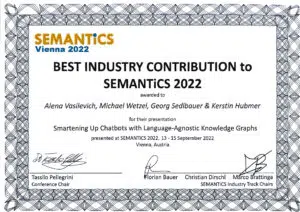Rachel Wheeler, Morningside Translations

Language localization services have been big business, and estimates indicate that the market will grow at an annual rate of about 7%. Companies that focus solely on translations services will continue to find demand for several years to come. The global marketplace, however, also presents new opportunities for language service providers (LSPs) to elevate their services and expand their businesses beyond translation alone.
Other LSPs Are Not The Only Competition
Some of the key benefits that professional translation agencies provide are quality translation and local expertise. To date, machine language translation software has had it limitations: poor quality, faulty grammar and syntax, and lack of contextual understanding. LSPs have benefited from these flaws by being able to provide a superior alternative.
For LSPs, neural networks mean more — and cheaper — competition in future.
However, in 2017, Google introduced Google Neural Machine Translation (GNMT). What GNMT promises to provide is a new machine approach that will directly compete with human translators. Machine learning translation software has relied on an algorithmic approach to translation that was an almost a word-for-word dictionary approach. Therein lies its major flaw: it can only learn through predictive behavior analysis.
Neural networks like GNMT, however, incorporate a more complex structure that mimics the way the human brain processes information. This approach replicates the idea of intuition in many ways, not simply hard definitions. In its first published iteration, Google is already claiming a 60% reduction in errors.
For LSPs, these neural networks mean more – and cheaper – competition in the future. The nature of work for translation agencies will need to change in order to remain relevant.
Marketing Remains the Realm of People
By far, the main edge LSPs will have over machine translation is experience and local cultural understanding. For global businesses, marketing their goods and services is not just a matter of translating words. Successful marketing understands the emotional impact of how information is presented.
Subtle differences in words –“discover” versus “find”, for example – have a different impact in sales and marketing than they do in more formal written content. Factoring in the additional layer of translation word choices, and the tone or intent of words can change dramatically beyond the original purpose.
Marketing content does not automatically translate from one language to another. Even visual imagery can fall in the purview of the cross-cultural marketer. Lingerie, for instance, is promoted differently in conservative countries than in the West. LSPs are in the perfect position to expand their services into marketing, either as outside consultants or even agency-level providers.
Essentially, their ability to localize is a human translator’s greatest differentiator. Whether that’s leveraged for eLearning localization or creating images for a website specifically geared towards a regional audience, this is where an LSP can still shine.
Data Mining Works In Any Language
With today’s enormous output of information, data mining has become big business of its own. Data miners often refer to their work as “discovering insights.” As they review the clicks of a website, the comments on social media, and results of customer surveys, they inherently build a consumer profile with cultural bias built in.
LSPs with experts in particular languages and cultures offer the opportunity to sift through these insights in the original language that a non-native speaker can miss in translation.
Plan Ahead for Competitive Advantage
The technology world makes no secret of its innovations. LSPs should keep on eye on the changes and trends and plan for the future. By anticipating the coming shift in global demand for translation service, language service providers can be ahead of their competitors instead of playing catch-up.
This guest post is written by Rachel Wheeler from Morningside Translations.



